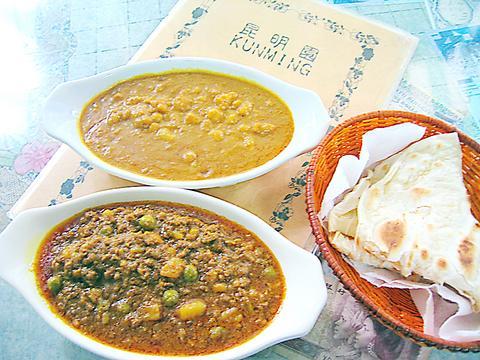Serving up a good selection of moderately priced Indian and South East Asian fare since opening in 1998, the Kunming has built up a reputation amongst it's regulars -- of which there are many -- as one of the capital's leading purveyors of consistently good, spicy food.
While many Taipei restaurants have good days and bad days, it's always a good day at the Kunming. Proprietor, Yacoob Mah (馬雲昌) ensures this by being on hand to make certain that the dishes prepared in his kitchen are cooked the way they should be and that patrons get exactly what they ask for when they ask for it. On any given day, be it lunch or dinner, Mah takes on the roles of both head chef and cordial host.

PHOTO: TAIPEI TIMES
Although I wouldn't normally recommend ruining one's appetite with starters at an Indian restaurant, the Kunming is the exception to this rule. A great way to start a meal is to dive straight in with a plate of samosas (NT$150), which dipped in the accompanying spicy sauce set you in good stead for your main course.
Choosing your main course at the Kunming is half the fun of any visit -- the other half being the eating of it. The menu's mini-international spicy food selection, while not overly grand, does offer patrons the choice of chowing down on a combination of dishes.
Indian dishes such as the fantastic curry daal (NT$180), the tastebud tingling spicy lamb (NT$240), or the creamy chicken masala (NT$220) go quite well, believe it or not, with coconut chicken (NT$220) and/or beef musakka (NT$240). To soak up the mouthwatering grub Mah provides great chapatis (NT$50) and fluffy briyana rice (NT$120).
Whatever you order, a must-try at the Kunming is the joint's Burmese cold-tea salad. At NT$180 a plate it's crisp, fresh, tangy flavor makes the perfect accompaniment to any meal.

April 14 to April 20 In March 1947, Sising Katadrepan urged the government to drop the “high mountain people” (高山族) designation for Indigenous Taiwanese and refer to them as “Taiwan people” (台灣族). He considered the term derogatory, arguing that it made them sound like animals. The Taiwan Provincial Government agreed to stop using the term, stating that Indigenous Taiwanese suffered all sorts of discrimination and oppression under the Japanese and were forced to live in the mountains as outsiders to society. Now, under the new regime, they would be seen as equals, thus they should be henceforth

Last week, the the National Immigration Agency (NIA) told the legislature that more than 10,000 naturalized Taiwanese citizens from the People’s Republic of China (PRC) risked having their citizenship revoked if they failed to provide proof that they had renounced their Chinese household registration within the next three months. Renunciation is required under the Act Governing Relations Between the People of the Taiwan Area and the Mainland Area (臺灣地區與大陸地區人民關係條例), as amended in 2004, though it was only a legal requirement after 2000. Prior to that, it had been only an administrative requirement since the Nationality Act (國籍法) was established in

Three big changes have transformed the landscape of Taiwan’s local patronage factions: Increasing Democratic Progressive Party (DPP) involvement, rising new factions and the Chinese Nationalist Party’s (KMT) significantly weakened control. GREEN FACTIONS It is said that “south of the Zhuoshui River (濁水溪), there is no blue-green divide,” meaning that from Yunlin County south there is no difference between KMT and DPP politicians. This is not always true, but there is more than a grain of truth to it. Traditionally, DPP factions are viewed as national entities, with their primary function to secure plum positions in the party and government. This is not unusual

US President Donald Trump’s bid to take back control of the Panama Canal has put his counterpart Jose Raul Mulino in a difficult position and revived fears in the Central American country that US military bases will return. After Trump vowed to reclaim the interoceanic waterway from Chinese influence, US Defense Secretary Pete Hegseth signed an agreement with the Mulino administration last week for the US to deploy troops in areas adjacent to the canal. For more than two decades, after handing over control of the strategically vital waterway to Panama in 1999 and dismantling the bases that protected it, Washington has